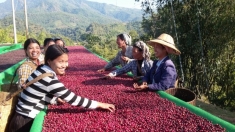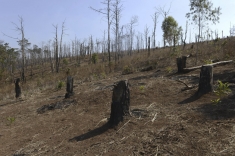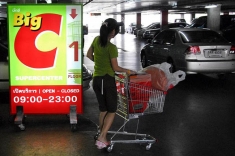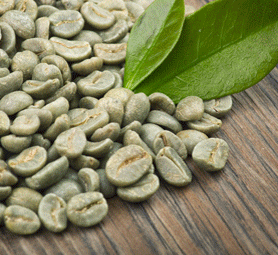
Administrator
Thank you to visit our website, for all the question please contact the administrator - General economic department.
Email: info@mascopex.com
The current state of the global coffee trade
Tuesday, 09 October 2012 04:50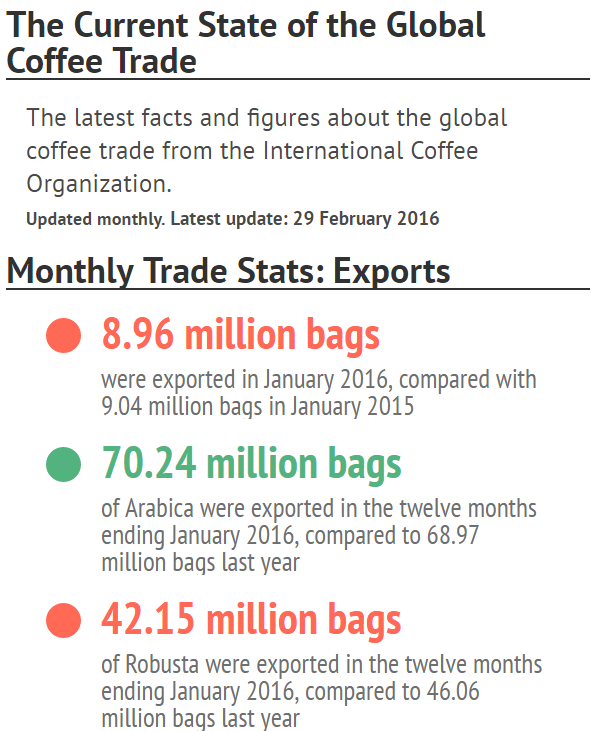
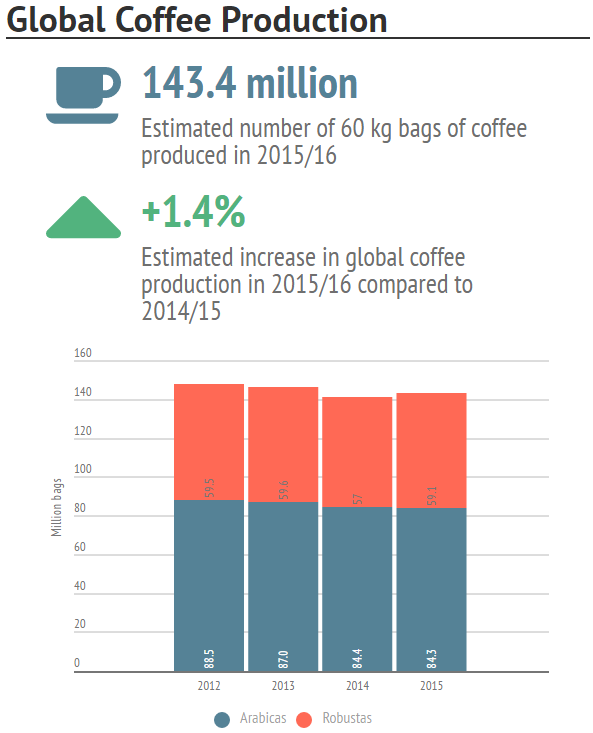
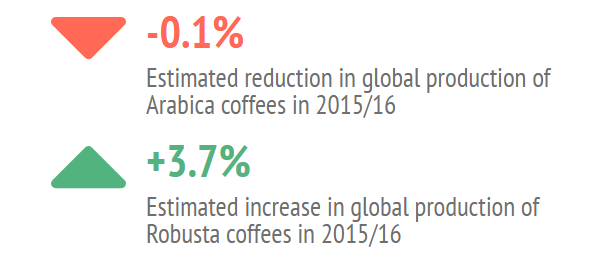
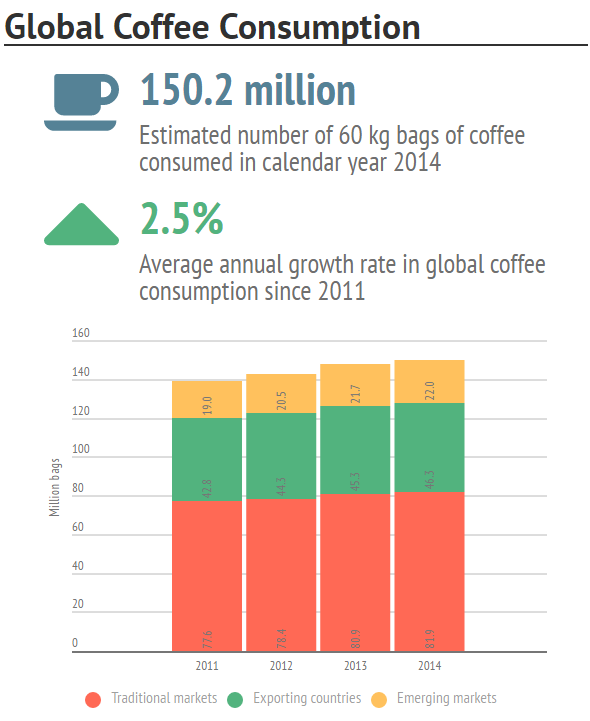
(www.ico.org)
After Record-Breaking Competition, Myanmar Coffees Coming to Atlanta
Tuesday, 09 October 2012 04:50A promising sign for the developing specialty coffee sector in Myanmar, coffees at the second ever Myanmar Coffee Association cupping competition generally outscored last year’s marks, with higher-scoring individual winners and a much higher percentage of total coffees reaching specialty grade.
Placed on the Specialty Coffee Association of America scale, 56 of 60 total samples gathered for the competition met the 80-point threshold, while the winning coffee —a fully washed SL34 lot from Green Land Coffee estate of Pyin Oo Lwin — came in at 87 points. The top dry natural coffee, and second-highest-scoring coffee overall, from the Ma Mi Nyo smallholder community of Shan State, earned 86.75.
At last year’s inaugural competition — organized by numerous organizations working to improve Myanmar arabica quality, to bring it to market and to support the country’s farmers — the top scoring coffee, by comparison, earned an 84.25, while 21 of the 58 coffees scored met the 80-point mark.
This event was part of the USAID-funded Value Chains for Rural Development projectimplemented by the nonprofit Winrock International and organized by the Myanmar Coffee Association and the Coffee Quality Institute.
Three international judges and two local observers assessed the coffee. The international team was composed of SCAA Board Member Andrew Hetzel, Momentum Coffee founder and SCAA Roasters Guild Executive Council President Allen Leibowitz, and Sustainable Harvest Relationship Manager Dane Loraas.
The competition included estate-grown coffees as well as those from small farms, with the field representing 30 fully washed coffees and 30 naturals. According to CQI, coffees featured in the Myanmar project — including the top-scoring coffees — will be cupped at next month’s SCAA Event in Atlanta, which takes place April 14-17.
(Nick Brown - dailycoffeenews)
Our Coffee Addiction Could Destroy Earth’s Tropical Forests
Thursday, 21 April 2016 00:00Soaring demand for the caffeinated brew could hasten destructive climate change by encouraging producers to chop down some of the last remaining tropical forests as they struggle to increase yields on existing farmland, according to a report released Thursday by the nonprofit Conservation International.
Coffee grows in tropical countries near the equator, such as Indonesia, Brazil and Uganda, where thick jungles rich with biodiversity provide fresh water and store tons of carbon. Farmers expand their fields by felling trees in these forests and burning the dense underbrush — releasing that carbon into the atmosphere, where it traps other gases and warms the planet. As a result, deforestation is a twofold environmental catastrophe: Left intact, forests absorb many of the pollutants that cause global warming. Destroyed, they unleash even more emissions and speed up the pace of climate change.
Worse, it’s a self-perpetuating cycle. As climate change worsens, the amount of existing farmland suitable for growing coffee shrinks.
The underlying market force in all this is the skyrocketing demand for coffee. Coffee growers may have to triple their production by 2050 to meet current demand forecasts, the report predicted. Coffee demand is expected to spike 25 percent in the next five years alone, according to a report last year by the industry group International Coffee Organization.
Consider the two maps below. The dark blue, red and yellow segments represent forested areas where certain types of coffee could be grown in Brazil in 2010.
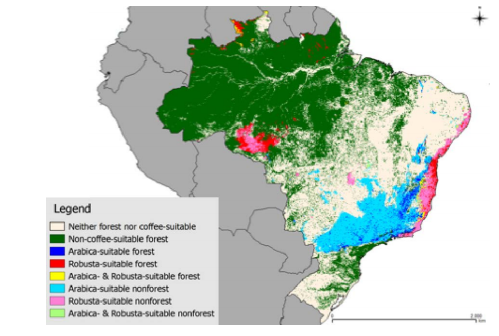
Now fast forward to the middle of the century. By 2050, much of the farmland where Arabica beans are produced, represented in light blue, is expected to recede. Farmland for Robusta, represented in light pink, nearly disappears.
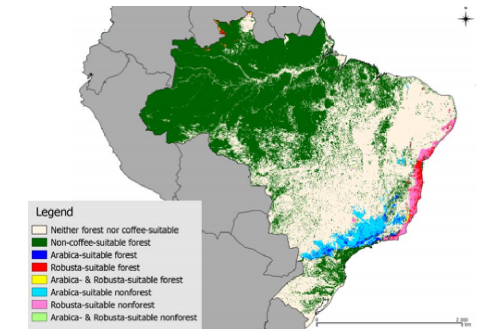
Quite a change in just 40 years.
“Ideally, plant breeders will develop new varieties that are adapted to the harsher conditions of the future, while, simultaneously, improving productivity. That is a tall order, but not impossible,” Tim Killeen, a lead author of the report, said in a statement. “If it doesn’t happen, then coffee production will shift to landscapes with conditions similar to today’s coffee growing areas.”
Tropical forests currently cover 60 percent of the land around the world that can be used for coffee production. By 2050, as much as 20 percent of the land suitable for growing coffee would fall within the boundaries of protected areas. That means farmers will either have to produce more with less land, or start clearing new lands on which to grow. Conservation International named the Andes, Central America and Southeast Asia as the regions of most concern.
There is a hope. Some of the world’s biggest coffee sellers, such as Nestlé and Starbucks, have begun improving their supply chains to increase farmers’ yields with more sustainable growing practices. But unless those efforts are stepped up, the quickened pace of deforestation and climate change may derail the progress already made.
“Unless we act now, the trend of coffee production towards full sustainability may well be reversed,” Peter Seligmann, founder and CEO of Conservation International, said in a statement. “The good news is that we know from our experience working with Starbucks and others that we can put the right practices in place to grow coffee in a way that protects forests and farmers — but we need to keep pushing these techniques on a global scale.”
Source: Huffington Post
Three foreign investors in race for purchase of Big C Vietnam
Monday, 28 March 2016 00:00Bloomberg reported that Lotte Group (South Korea), TCC Holding and Central Group (Thailand) have applied to participate in the auction for the Big C Vietnam chain.
To own Big C chain, the investor will have to pay about US$800 million.
To cut debt, Casino Group of France is selling some assets in Asia and Latin America, while focusing on business activities in its largest market – France.
Last year, Lotte Group said it planned to open 60 supermarkets in Vietnam by 2020. The Korean group runs the fast food chain Lotteria, shopping centers, hotels and cinemas in Vietnam.
Meanwhile, in January 2016, TCC Holding of the Thai billionaire Charoen Sirivadhanabhakdi completed the acquisition of Metro Cash & Carry Vietnam with 655 million euros.
Earlier, many large retail groups wanted to join the race to own the Big C chain in Vietnam, including Singapore’s Dairy Farm; Japan’s Aeon …
The sale of Big C Vietnam was decided after Big C Thailand was sold late last month for $3.5 billion.
Casino Group has not made any comment about the new information.
Lotte representative told Bloomberg that they were very interested in the deal.
Meanwhile, TCC Holding and Central Group both declined to answer questions about the deal.
However, in an interview with Techinasia few days ago, the Central Group’s CEO Tos Chirathivat seemed to be unsure about the deal because the process of buying and selling Big C Vietnam is a lot more complex than the Big C Thailand.
Lotte Group last year announced plans to open 60 supermarkets in Vietnam until 2020. The purchase of Big C Vietnam can be considered as the easiest way for them to achieve this ambition.
(bussinesstimes.com.vn)
VIDEO CLIP

" MASCOPEX Joint Stock Company has been striving to become the Top Prestige –Trust – Quality in the fields of import & export Agricultural Product. "



